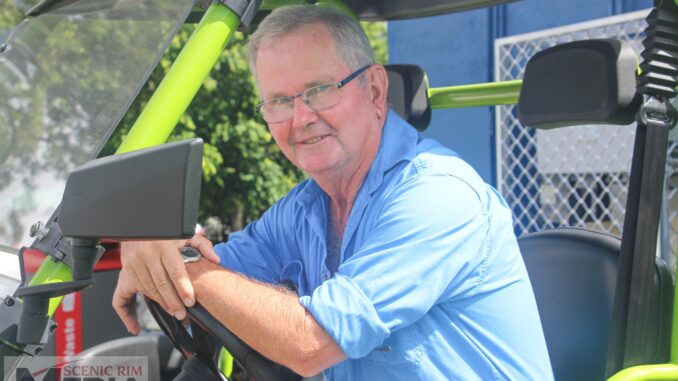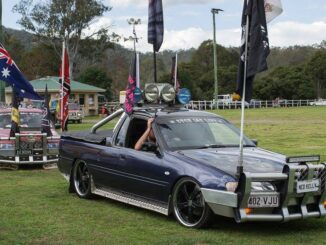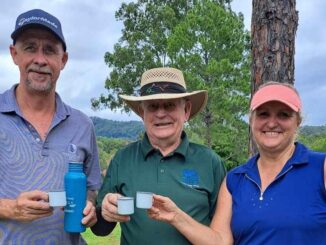
While country living is popular these days, not many people can claim to be farmers. Fourth generation farmer, Paul Mahony, grew up on his family farm and has spent his whole life on the land.
PAUL Mahony’s family came to Canungra in the mid 1800s.
His great-grandfather, Hugh Mahony, was one of the first settlers in the area and his grandfather, Jesse, settled in Pine Creek in 1933.
Paul is a fourth generation farmer and as soon as he was old enough, he was working on the farm, milking dairy cows every morning and every afternoon.
Paul says he didn’t start early – his father Cyril and uncle Wilf got up earlier to get set up, then Paul staggered in to the dairy shed at six o’clock.
Jesse and his family, including Paul’s father Cyril and uncle Wilf, cleared acres of scrub with axes and cross cut saws, preparing it for dairy cattle and crops.
“They felled the scrub mainly with axes. They had cross-cut saws but there were no chainsaws,” Paul said.
“Dad used to plough the ground with two Clydesdales, Prince and Boy. It was bloody hard work.”
Paul milked cows before and after school. He says he didn’t start early – his father and uncle got up early to get the cows in and get set up, before Paul staggered in to the dairy shed at six o’clock.
“It was seven days a week – it is no life. I never had a day off when I was a kid.”
He was amongst the first Year One students to start at Canungra State School at its existing location to go all the way though the school, in the early 1960s.
Most of the students were farmers children, with a few army children as well.
It was a small school and very friendly, so the transition to high school at Beaudesert State High School with 600 students was an eye opener.
“We had a Deputy Principal, a short bald headed man … we had the cane in those days and he could wield that cane. You’d see the boys come back and their hands were bruised.”
Paul didn’t get the cane in high school but he did get it in Year Six at Canungra on two occasions.
Once when he and Ricky Finch broke a window.
“I threw and hit him and that was all right but he threw a rock back and missed me and broke the window!”
The second time he got the cane was for breaking into the library through the window, although he was unsure of why he wanted to get in there so badly.
He enjoyed his school days and really felt the isolation of being on the farm when he finished.
After school, Cyril gave Paul two options – he could do a mechanic’s apprenticeship with the local mechanic Wally Rowe, or milk cows for the rest of his life.
He chose to milk cows.
“I was young, dumb and pretty shy – it was what I knew.”
“I’d go to a dance, get home at one o’clock … so tired and had a few beers. All I wanted to do was put my head on the cow’s belly and go to sleep, but no … milk the cows. Sleep all day then milk the cows again in the afternoon.”
“I didn’t realise there was such as thing as an afternoon and you could do other things. I just had to milk cows.”
When Cyril and Wilf were in their sixties, they decided to transition the farm to beef cattle, which Paul says was a relief.
“We just sold the big stainless steel vat, the shed and machines are still there. We sold the herd.”
Paul has seen a lot of changes in Canungra and one of the first things he mentioned was being able to drive into the main street of town, do a U-turn and park anywhere on the other side of the road.
“Where we used to have a garage, we have a gym – I don’t believe in that,” he says.
“Go out and do a day’s work.”
Paul’s two daughters moved away, which begs the question what is there for them to come back to?
“The saving grace is that we’re not far from the Coast if they work there.”
He wouldn’t wish a farming life on his daughters, saying the writing is on the wall for farmers in Canungra.
“It is all going to be little lifestyle blocks. It is phenomenal what it’s worth, it is ridiculous. Back in 1970 we bought the block I live on and the 300 acres there. We bought it for $31,000. That was a lot of money, Wilf and Dad had to take out a loan. Now, you couldn’t put a figure on it – how long is a piece of string?”
Now in his sixties himself, Paul is still working seven days a week. Between keeping on top of weeds, fencing, selling and looking after the cattle he says he can’t get a break.
He can’t see giving up life on the land entirely but might like to downsize to one paddock at some stage.
“It’s a really cool feeling for me to even be able to go away for a couple of nights and know you don’t have to go back that afternoon to feed the dogs and do this and do that. That’s bloody cool, that.”
Asked when the last time he did that, Paul thinks carefully and responds, “Years.”




